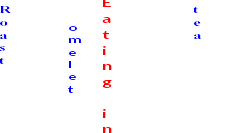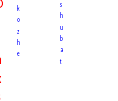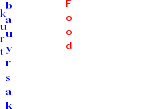Theme: Eating in Great Britain.
Grade: 7
The aims of the lesson:
- Educational: to form skills in monologue and dialogue speech, to enrich pupil’s vocabulary on the given theme;
- Developing: to develop pupil’s abilities in speaking, reading, communicative competence, to develop their creative abilities through different kinds of activities;
- Bringing-up: to teach pupils to respect other cultures, to broaden pupils’ minds, to bring up the feeling of international friendship.
The procedure of the lesson:
I. Organization moment.
Pupils: Good morning, good morning,
Good morning to you!
Good morning, good morning,
We are glad to see you!
Teacher: Good morning, good morning,
Good morning to you!
Good morning, good morning,
I’m glad to see you!
Answer my questions:
1) Who is on duty today?
2) Who is absent?
3) What is the day/date is it today?
4) What is the weather like today?
II. Phonetic drill
Look at the blackboard, now we are going to learn a new rhyme.
Breakfast in the morning
Dinner in the day.
Tea comes after dinner
Then it’s times to play.
- Listen to me very, attentively. I read the rhyme.
- Everybody, read the rhyme line by line after me. /in chorus/in chorus without me/.
- Who wants to read the rhyme?
III. Checking up home task.
- Where do tigers come from?
- Where do elephants come from?
- What colour is a wolf?
- What colour is a bear?
IV. New theme.
Today we are going to talk about food, will discuss what food is popular in Britain and what food people usually eat in Kazakhstan.
V. New words
Survey – опрос, hаm – ветчинa, bacon – бекон, roast beef – ростбиф, toast – подрумяненный ломтик хлеба, honey – мед, sausage – колбаса.
VI. Work with the dialogue. /read and translate/.
Answer my questions.
1/ What is Ann asking Talgat about?
2/ What does Talgat like to eat?
3/ What does he like to drink?
4/ What doesn’t he like?
VII. Doing exercise
Ex. 2 Complete the chart.
Fruit
Drinks
Other food
bananas
coke
fish
…….
…….
…….
…….
…….
…….
…….
…….
…….
Ex 3. Plural and singular.
Singular
Plural
fruit
bananas
m….
o……
……..
……..
Ex4. Countable or uncountable.
cars , water , air, bottles, apples, bread, tea, dollars, money, peas, lemons, sugar,
salt, eggs, toys , milk, sandwiches, ham, cheese, coffee.
Ex 7. Much and many.
- We need ______ oranges to make orange juice.
- I don’t drink _____ milk – one litre a day.
- He doesn’t always put ______ salt on his food.
- My doesn’t car use ______ petrol.
- They haven't ______ money. They are not rich.
- There aren't _____ potatoes in the box.
VIII. Read the text. Translate.
- What kind of reputation does British food have in Europe?
- What do they usually eat on Sundays?
- What kind of drinks do they like?
- Which meal is the chief meal of the day?
- What do they eat for supper?
Make up diagram. Eating in Britain.
Eating in Kazakhstan.
IX. Home task ex. 14, 18.
X. Conclusion and putting marks.
Today you have learnt a lot of information about eating in Brittan’s. You’ve done a lot of work today. I put marks …Our lesson is over. Good buy.
Theme: Eating in Great Britain.
Grade: 7
The aims of the lesson:
- Educational: to form skills in monologue and dialogue speech, to enrich pupil’s vocabulary on the given theme;
- Developing: to develop pupil’s abilities in speaking, reading, communicative competence, to develop their creative abilities through different kinds of activities;
- Bringing-up: to teach pupils to respect other cultures, to broaden pupils’ minds, to bring up the feeling of international friendship.
The procedure of the lesson:
I. Organization moment.
Pupils: Good morning, good morning,
Good morning to you!
Good morning, good morning,
We are glad to see you!
Teacher: Good morning, good morning,
Good morning to you!
Good morning, good morning,
I’m glad to see you!
Answer my questions:
1) Who is on duty today?
2) Who is absent?
3) What is the day/date is it today?
4) What is the weather like today?
II. Phonetic drill
Look at the blackboard, now we are going to learn a new rhyme.
Breakfast in the morning
Dinner in the day.
Tea comes after dinner
Then it’s times to play.
- Listen to me very, attentively. I read the rhyme.
- Everybody, read the rhyme line by line after me. /in chorus/in chorus without me/.
- Who wants to read the rhyme?
III. Checking up home task.
- Where do tigers come from?
- Where do elephants come from?
- What colour is a wolf?
- What colour is a bear?
IV. New theme.
Today we are going to talk about food, will discuss what food is popular in Britain and what food people usually eat in Kazakhstan.
V. New words
Survey – опрос, hаm – ветчинa, bacon – бекон, roast beef – ростбиф, toast – подрумяненный ломтик хлеба, honey – мед, sausage – колбаса.
VI. Work with the dialogue. /read and translate/.
Answer my questions.
1/ What is Ann asking Talgat about?
2/ What does Talgat like to eat?
3/ What does he like to drink?
4/ What doesn’t he like?
VII. Doing exercise
Ex. 2 Complete the chart.
Fruit
Drinks
Other food
bananas
coke
fish
…….
…….
…….
…….
…….
…….
…….
…….
…….
Ex 3. Plural and singular.
Singular
Plural
fruit
bananas
m….
o……
……..
……..
Ex4. Countable or uncountable.
cars , water , air, bottles, apples, bread, tea, dollars, money, peas, lemons, sugar,
salt, eggs, toys , milk, sandwiches, ham, cheese, coffee.
Ex 7. Much and many.
- We need ______ oranges to make orange juice.
- I don’t drink _____ milk – one litre a day.
- He doesn’t always put ______ salt on his food.
- My doesn’t car use ______ petrol.
- They haven't ______ money. They are not rich.
- There aren't _____ potatoes in the box.
VIII. Read the text. Translate.
- What kind of reputation does British food have in Europe?
- What do they usually eat on Sundays?
- What kind of drinks do they like?
- Which meal is the chief meal of the day?
- What do they eat for supper?
Make up diagram. Eating in Britain.
Eating in Kazakhstan.
IX. Home task ex. 14, 18.
X. Conclusion and putting marks.
Today you have learnt a lot of information about eating in Brittan’s. You’ve done a lot of work today. I put marks …Our lesson is over. Good buy.




















